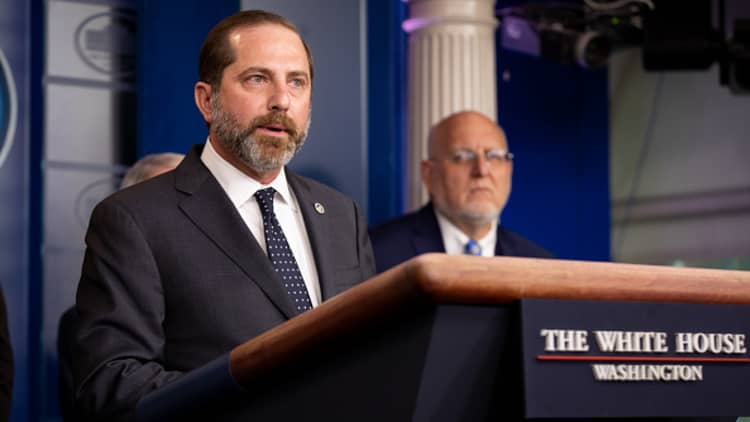The U.S. government's response to the coronavirus has been uncoordinated and its guidance has been unclear as cases surge across the country, according to former U.S. Surgeon General Dr. David Satcher.
If he were to grade the nation's leadership in the pandemic, Satcher said he would give them a C "at best."
"I think we have not coordinated with each other well enough, we have not been clear about what the guidelines are. In many cases we disagreed among ourselves as opposed to meeting," said Satcher, who ran the Centers for Disease Control of Prevention. Former President Bill Clinton appointed him to both positions.
"I'm not a part of the administration, of course, but I think when it comes to leadership during this pandemic, I think we are lacking," he said.
Satcher was one of four former directors of the CDC who coauthored a recent op-ed in the Washington Post criticizing the administration for dismissing advice from public health officials, specifically about how to reopen schools safely in the fall.
The directors, who served under both Democrat and Republican presidents, wrote that the U.S. faces "two opponents" in its efforts to reopen the country: Covid-19 and politicians and others attempting to undermine the CDC.
"I think we are mixing the politics and the science in a way that can be very dangerous," Satcher said in an interview with CNBC. "In my work, in public health and in government, I have not seen this before. People may disagree for a short period of time, but then they get together and discuss it and then the decision is made."
Over the course of the nation's response to the pandemic, however, there's been conflicting advice from the health community and politicians, such as the decision to mandate face coverings when in pubic to help curb the spread of Covid-19. Epidemiologists, who didn't originally recommend using face masks at the beginning of the pandemic, have since said masks can slow the virus' spread.
Trump, who resisted wearing a mask for months, fully embraced the idea this week and urged all Americans on Tuesday to wear them whenever they can't practice social distancing.
In the absence of consistent federal or state policies, big retailers like Walmart, Target, Kroger, Best Buy and Apple have started requiring customers in every state to wear a face covering before entering their stores policies.
While the science isn't 100% correct all of the time, and much is still unknown about Covid-19, the U.S. should alter its guidelines to incorporate the best information scientists have on hand as it's made available, Satcher said.
"There's a lot of things we don't know about this virus, but we must monitor it and make decisions based on what is the best available information at the time," Satcher said. "We have an opportunity to make real progress in reducing the level of infections and spread of this disease and yet we're not doing that."
Satcher praised the administration's daily press briefings earlier in the pandemic when administration officials were joined by scientists on the White House's task force, like Dr. Anthony Fauci, director of the National Institute of Allergy and Infectious Diseases, to brief the public.
On Monday, President Donald Trump said he will resume holding coronavirus press briefings at the White House, likely starting Tuesday, for the first time in nearly three months. The announcement comes as the U.S. continues to see Covid-19 cases rise as Trump's popularity with voters declines.
Trump told reporters earlier this week "we have had this big flare-up in Florida, Texas, a couple of other places," but said a lot of the country "is doing well." The president has distanced himself from some of his health experts, including Fauci, who Trump said could be "a little bit of an alarmist" in an interview with "Fox News Sunday."
"The White House and CDC have been working together in partnership since the very beginning of this pandemic to carry out the President's highest priority: the health and safety of the American public," White House spokesman Judd Deere said in an email when asked about the directors' criticism of the administration.
"The CDC is the nation's trusted health protection agency and its infectious disease and public health experts have helped deliver critical solutions to save lives," he said.
Satcher also said the country must make a committed, long-term effort to eliminate the health disparities in communities of color that have been laid bare by the Covid-19 pandemic. He was the first Black director of the CDC and wrote "My Quest for Health Equity: Notes on Learning While Leading," which is scheduled for release in September by Johns Hopkins University Press.
Epidemiologists have found that Black and Hispanic people have been dying at a disproportionately higher rate from Covid-19 than White people.
"The problem is often when one administration leaves and another comes, you forget about the commitments the nation made," he said. "It shouldn't go away when a new administration comes in."



